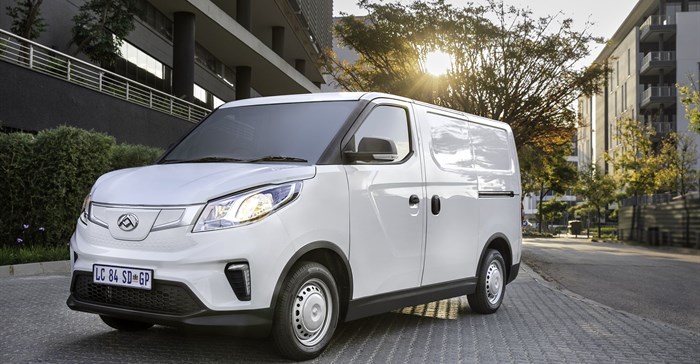One of the world's top five electric vehicle (EV) manufacturers, Shanghai Automotive Industrial Corporation (SAIC), has recruited a South African dealer and distributor to market and sell its commercial EVs. Maxus Electric Vehicles (EV), the newly founded green mobility business, is one of the country's first distributors to focus solely on the EV industry.
Maxus EV will provide access to EVs to urban logistics fleets, allowing them to cut the total cost of ownership and make considerable progress towards their net-zero targets. Early customers in South Africa, including Woolworths and DSV, have already driven over 1 million km while saving over 220,000kg of harmful carbon emissions.

Source: Supplied
Green mobility enables companies to reduce fleet operating costs by up to 80% and save more than a tonne of emissions per vehicle per month
"With environmental and sustainability concerns rising up the corporate agenda and the growing operational efficiencies of EVs, there is a compelling business case for decarbonising urban logistics fleets,“ said Ndia Magadagela, CEO at Maxus Electric Vehicles.
"We are excited to partner with one of the leading EV manufacturers to offer South African companies access to commercial EVs that enable them to simultaneously reduce CO2 emissions and harvest cost savings."
Proof of concept with Maxus vehicles shows that each EV on the road saves more than a tonne of carbon emissions each month. Operating costs are attractive compared to ICE vehicles, at around 40 c/km to run a Maxus EV compared to around R2/km for a combustion engine. The low maintenance nature of EVs helps to improve asset utilisation, delivering further efficiencies.
Maxus will initially focus on the Gauteng market, with the opening of one of South Africa’s first all-electric vehicle dealerships, showrooms and service centres in Menlyn, Pretoria. Launches will follow in Cape Town, Durban and other metropolitan areas. Financing is available from major commercial banks.
The green mobility business will initially offer three commercial EV models to the South African market.
Global auto sales
The global EV market is reaching its tipping point, with Morningstar forecasting that EVs will account for 40% of global auto sales by 2030—more than five times the number of EVs sold in 2022. However, growth in South Africa has been somewhat slower because high upfront prices have dampened enthusiasm in the consumer market for EVs.
"It is testimony to the efficiency of commercial EVs that they outshine traditional internal combustion engine fleets in terms of operational costs—despite the ad valorem taxes added to EV imports in South Africa," says Magadagela. "Lower duties could help to encourage faster adoption of commercial EVs and shape a cleaner energy future.
"We urge government, commercial fleets, financing companies, and other stakeholders to join hands to accelerate adoption of EVs in South Africa. Fast-tracking the migration to EVs will not only help us to pave the way for a more sustainable future and meet Net Zero goals – it will also ensure our global competitiveness as the world decarbonises vehicle fleets."













